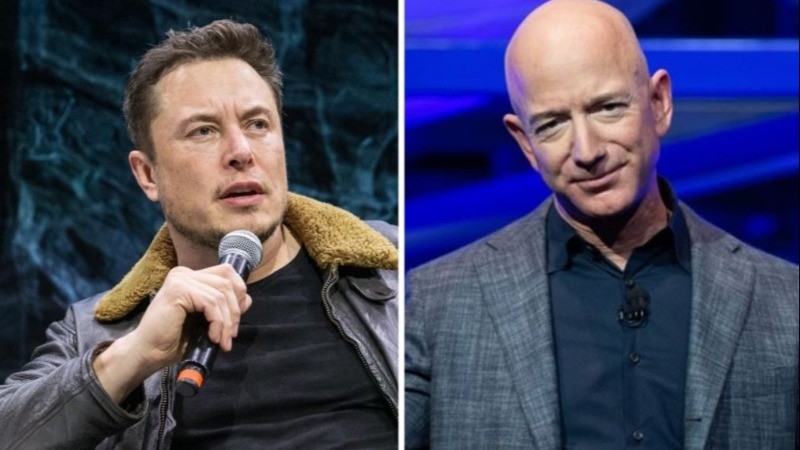
Elon Musk’s SpaceX is often regarded as the leading name in private space exploration, but he isn’t the only wealthy entrepreneur with ambitious plans for humanity’s future beyond our planet. Jeff Bezos, the founder of Amazon and another centi-billionaire, established his own space venture, Blue Origin, funding it by selling approximately $1 billion worth of Amazon stock annually. Meanwhile, Richard Branson, the dynamic English entrepreneur behind the Virgin Group—which spans industries from airlines to healthcare—has also ventured into the cosmos with his commercial spaceflight company, Virgin Galactic.
Space Exploration Technologies Corp.’s reusable Falcon 9 rocket has achieved a significant milestone, becoming the most frequently flown rocket in the world. This development not only lowers the cost of space transportation but also gives SpaceX a dominant position in launch missions, particularly for its own Starlink satellites. Currently, around 6,000 Starlink satellites orbit the Earth, providing high-speed internet access almost everywhere. This success highlights the effectiveness of vertical integration, especially following the recent recovery of a Starship rocket booster through a groundbreaking maneuver that promises even cheaper launch options.
In contrast, SpaceX's competitors, including Jeff Bezos and China, are lagging behind, while Europe faces particularly tough challenges in the space sector. Once a leader in commercial satellite launches with its Ariane program, Europe has seen its position diminish, even relying on SpaceX for launches in recent years. Established satellite companies like Eutelsat Communications and SES have struggled against newcomers like Starlink, compounded by their reliance on outdated business models, such as traditional TV broadcasting in the era of streaming services like Netflix. This has led to painful restructuring, with both Eutelsat and SES merging with competitors, and Airbus planning significant job cuts in defense and space sectors. According to the think tank Ifri, “The need for a major leap is becoming more pressing.”
The stakes are higher in the space sector than in typical tech rivalries, given the geopolitical implications. Starlink terminals have played a vital role in Ukraine's defense, yet there are concerns about their potential misuse by Russian forces. Musk has also used Starlink to exert influence, such as when the service initially refused to comply with Brazilian regulations to restrict access to his social media platform X. For the European Union, relying on SpaceX in a $630 billion global space economy—especially with China's resurgence—poses a risk. It raises questions about whether Musk will consistently prioritize cooperation, despite his past criticisms of EU regulations and his ties to political figures like Donald Trump.
Brussels has proposed various strategies to regain competitiveness, highlighted in the Mario Draghi report on European competitiveness, which suggests ten initiatives ranging from fostering space startups to simplifying the EU’s fragmented governance. The EU has also suggested a new satellite constellation project named IRIS² to boost investment. However, while increased government spending could stimulate demand for companies like Eutelsat, the project has faced delays, raising concerns about political will at a time when countries like France and Italy are tightening their budgets. Furthermore, Europe still lacks its own reusable launcher and a cohesive business model akin to Starlink.
To effectively compete with Musk, Europe needs a clearer, simpler vision: a plan that brings together investors, entrepreneurs, and regulators to create what Europe has historically excelled at—providing taxpayer-funded public services at a low cost. Aiming to offer affordable internet access—around $50 per month, compared to Starlink’s $100—could help target the estimated 5 million households in Europe currently underserved by internet connections. This initiative could potentially expand globally and offer a reliable internet solution for remote workers, travelers, and military operations without dependence on a volatile US tech billionaire.
Getting back into the space race requires clarity about the goals and methods involved, particularly as public sentiment shifts and budgets are scrutinized. Economists estimate that approximately $12 billion (less than 0.1% of the EU's GDP) would be necessary over seven years to establish a "European Starlink," with half allocated for reusable launchers and the remainder for developing and launching satellites. While telecom operators may resist increased competition and express doubts about satellite viability, it is crucial to involve them in the conversation. Europe must avoid missing out on this opportunity due to the skepticism of established players.
As with any space endeavor, the risks are significant, but remaining stagnant on the launchpad presents its own dangers. If Musk's rivals fail to articulate the tangible benefits of advancing in the space race, the consequences could be dire.